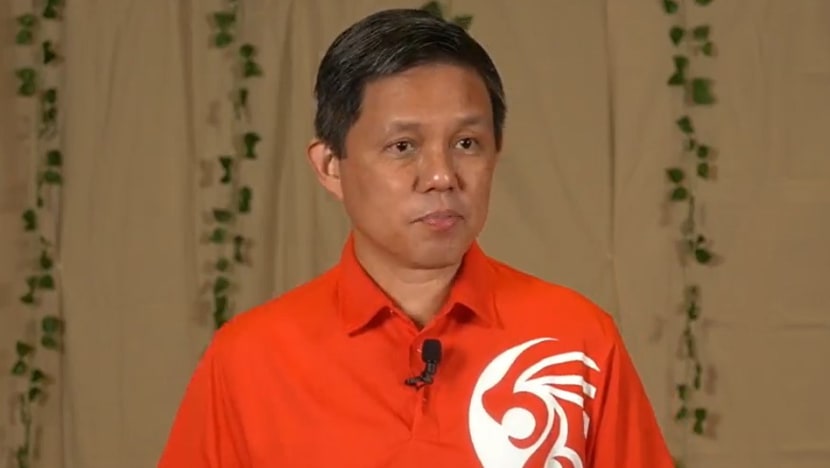
SINGAPORE: Mental health lessons will be progressively rolled out to students at the primary, secondary and pre-university levels over the next two years, announced Minister for Education Chan Chun Sing on Saturday (Dec 11).
As part of the refreshed character and citizenship education curriculum this year, mental health lessons have already been introduced to all lower secondary students.
“We aim to equip students with the knowledge and skills to build their resilience, strengthen their mental well-being and resolve their challenges,” said Mr Chan.
Speaking at the launch of an e-book collection of stories from youths of diverse backgrounds, Mr Chan gave an update on the Ministry of Education’s (MOE) efforts to strengthen students’ mental health following his ministerial statement in Parliament earlier this year.
“Our youths face multiple pressures in their world today. They grapple with managing their social life while balancing their academic and professional pursuits,” said Mr Chan.
“They deal with expectations that are both self-imposed and imposed upon them by society and their families. They also need to learn to navigate and thrive in a competitive, high-performing environment.
“On top of all this, our youths’ face unique challenges that the older generations have never experienced before,” he added, citing how technology and social media have potentially fuelled feelings of anxiety and increased social pressure in many youths.
Beyond mental health education lessons, all schools also have dedicated time and space at the start of every term for teachers to check in on students’ well-being since September, said Mr Chan.
Teachers have been provided with “practical pedagogical resources” and tools to monitor and support students’ well-being, he added.
“Lesson activities have also been designed to help teachers kick-start conversations with students to share and to discuss well-being issues, and to reinforce class commitment to look out for one another,” said the Education Minister, adding that this will be a “key feature” in schools.
A peer support structure is also in place at all schools, said Mr Chan.
“We will continue to widen the outreach and deepen the capabilities of these peer-led self-help communities,” he added.
In his ministerial statement in July following the incident at River Valley High School, Mr Chan had called for parent support groups to expand their role in helping parents whose children and family may need support.
Now, 25 such groups are “leading the charge” in various ways, said Mr Chan.
“Some are sharing resources and directing fellow parents to community helplines. Others are organising sessions to share parenting tips and advice on identifying signs of stresses and ways to seek help,” he said.
Citing the formation of the Interagency Taskforce for Mental Health and Well-being, he added that supporting youths in this area takes a whole-of-government approach. The taskforce is led by Senior Minister of State for Health Janil Puthucheary.
“This taskforce was set up to oversee mental health and well-being efforts on a national level, focusing on cross-cutting issues that require interagency collaborations,” Mr Chan said.
Together, MOE and the Ministry of Social and Family Development lead a workstream that seeks to provide greater support to families, children and youths to enhance mental well-being.
“Together with MOH (Ministry of Health) and other agencies, we are working on areas such as helping youths and parents to better access coordinated mental health services, partnering and empowering parents to strengthen and support their child’s mental well-being, and harnessing the potential of digital technology and social media while addressing its negative impact on the mental well-being of our youths,” said Mr Chan.
The issues that affect mental well-being are “multi-faceted”, and all stakeholders need to work together to make a difference to the mental well-being of youths, said the Education Minister.
“Together we must find ways to make the digital world safer for our youths so that they can fully harness the benefits of technology,” he added.
As a start, this could include working with social media platforms to enhance online protection mechanisms for youths, exploring age verification requirements and addressing hurtful anonymous comments from users online.
As a society, Singapore also needs to “find a way” to “broaden our definitions of success”.
“This is a fundamental cultural change that we need to bring about. We need to let our children know that success is not based just on how well they do in examinations,” said Mr Chan.
“As a society, we want to embrace a diversity of talents that will strengthen our country’s resilience.”
MOE has made “some structural shifts” in recent years to reduce the overemphasis on academics as a measure of success, he added, noting the new Primary School Leaving Examination scoring system.
There is also education and career guidance in every school to help students discover their strengths and interests to guide their choice of future schools and careers.
“But we still have a long way to go,” he said. “In spite of recent efforts, the prevailing skewed perspective remains that getting a good degree is the failproof way to secure a good future.”
And that is why Singapore needs to remove the “artificial and incomplete yardsticks of success prescribed by others”.
“In its place, we must recognise and value the intrinsic worth of each and every youth and empower them to find their own path forward and to chart their own destiny,” he added.
“We want to strive for multiple pathways of success, not just multiple pathways to success, as if there is only one definition for success.
[“source=channelnewsasia”]





